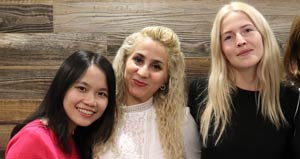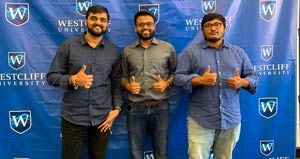
Westcliff University Students from Nepal Showcase Incredible Tech Innovations
Westcliff University is excited to highlight the remarkable achievements of students from its affiliate institute, King’s College Nepal. Recently, students showcased their impressive technologically advanced projects to visiting, highly regarded Westcliff academic and administrative leadership. Each project is a testament to their ingenuity, perseverance, and commitment to innovation. These ongoing projects stemmed from Westcliff curriculum, school clubs, or were part of a 36-hour “hackathon,” which saw students compete to create fully realized tech-based products within that time constraint. From Internet of Things (IoT) voice assistants to cybersecurity guidelines and more, these projects reflect the diverse talents and high achieving aspirations of Nepalese students.
Westcliff University’s Dean of the College of Business, Dr. William Lightfoot said, “I love how our students have clearly applied what they have been learning – often creating world-class solutions with limited resources. And to see how successful they are in competing against teams from around the world was really a great testimony to the faculty and the overall quality of education delivered by Westcliff in Nepal.”
Situated in New Baneshwor, Kathmandu, King’s College was founded in 2011, with the mission to establish itself as a benchmark for quality education in Nepal. It is a proud affiliated institution of Westcliff University and offers various academic programs of Westcliff in Nepal.
 Voice Assistant (ZARA)
Voice Assistant (ZARA)
The team comprising Prahar Neupane, Prabesh Pandey, Apekshya Shakya, Chetana Shakya, Sudan Shrestha, and Subham Karki developed an IoT-based Voice Assistant named ZARA. This innovative project was built using Python and various libraries, integrating a Raspberry Pi, a microphone, and an LED display. Additionally, they created a voice-operated IoT smart bulb controlled via a smartphone.
The most significant hurdle faced by the team was transferring their code from a PC to a Raspberry Pi, compounded by compatibility issues with the Linux OS and the microphone. Despite limited hardware resources, which necessitated repeated use of the same Raspberry Pi device, the team’s determination saw them through. Their favorite moment? Witnessing ZARA respond accurately to commands, performing tasks like playing music and lighting the bulb.
The team’s interest in AI and machine learning drives their ambition to integrate ZARA into future projects, enhancing its capabilities and smart functionalities. This project underscored the importance of teamwork, guidance, and perseverance, reinforcing their commitment to continuous learning and innovation.
Personal Security Checklist
Sangay Lama and Ruza Paneru from the affiliated Westcliff BSIT program focused on enhancing digital safety with their Personal Security Checklist. Developed under the auspices of the college’s cybersecurity club, this project offers a comprehensive set of guidelines aimed at improving personal cybersecurity practices.
Striking a balance between technical accuracy and user-friendly language was their biggest hurdle to overcome. However, the rewarding feedback from peers and faculty affirmed the practical value of their work. The guidelines were well-received, and were complimented on their accessibility and ease of implementation. The team said, “Knowing that our work could help others protect their digital lives was incredibly rewarding.”
This project aligns seamlessly with Sangay and Ruza’s career goals in cybersecurity. It provided them with practical experience in addressing common security vulnerabilities and enhanced their skills in communicating complex information effectively, and learned that clear communication is just as vital as technical knowledge when it comes to cybersecurity. If you are interested in pursuing a career in cybersecurity, Westcliff University offers an undergraduate certificate in cybersecurity, as well as a graduate certificate in cybersecurity. The perfect opportunity to gain the knowledge needed to enter a field which is rapidly growing and evident within this project, always being innovated.
Puck Collect and Generative AI
Shashank Shree Neupane and Atish Shakya embarked on a multifaceted journey with projects including Puck Collect, Generative AI which was created in mind for construction management, and programming for NASA’s Astrobee robot. Their projects demonstrated advanced robotics and AI capabilities, despite facing significant robotic resource limitations in Nepal, necessitating creative alternatives. The Generative AI project demanded extensive resources for model training. Programming the Astrobee robot required simulating the ISS environment and navigating 3-D space coding. Their solution was successfully improvising with available materials to achieving precise outputs in AI projects and mastering quaternion usage in 3-D space.
These projects reinforced their educational and career goals centered on AI and IoT. The hands-on experience in problem-solving and innovation under resource constraints will undoubtedly shape their future endeavors. They learned that perseverance, creativity, and teamwork are crucial in overcoming challenges with a team member saying, “Nothing could keep us from reaching the goal. Limited resources or time do not prevent us from achieving what we have started to complete. We just need to focus on what we should do and keep on doing that until we achieve it.” Explore Westcliff’s College of Technology and see how you can jumpstart your career.
PIXEL-CHAIN: Sairash Sharma Gautam
Westcliff affiliate BSIT student Sairash Sharma Gautam developed PIXEL-CHAIN, an event photo-sharing app leveraging blockchain and IPFS for secure storage. Created during a 36-hour hackathon, this project epitomizes rapid development and innovative thinking. The time constraint and sleep deprivation were the biggest challenges. However, the satisfaction of seeing the app come to life, coupled with the successful operation of the blockchain app on the first try, made the effort worthwhile. This project will surely further their aspirations in blockchain and AI, fields he is passionate about pursuing. He discovered that with a lot of dedication and helps with some caffeine, incredible feats can be achieved within tight timelines.
These projects from the King’s College Nepal underscore the innovative spirit and technical prowess of Westcliff University’s students. Their achievements not only contribute to technological advancement but also inspire a culture of perseverance, teamwork, and continuous learning.






